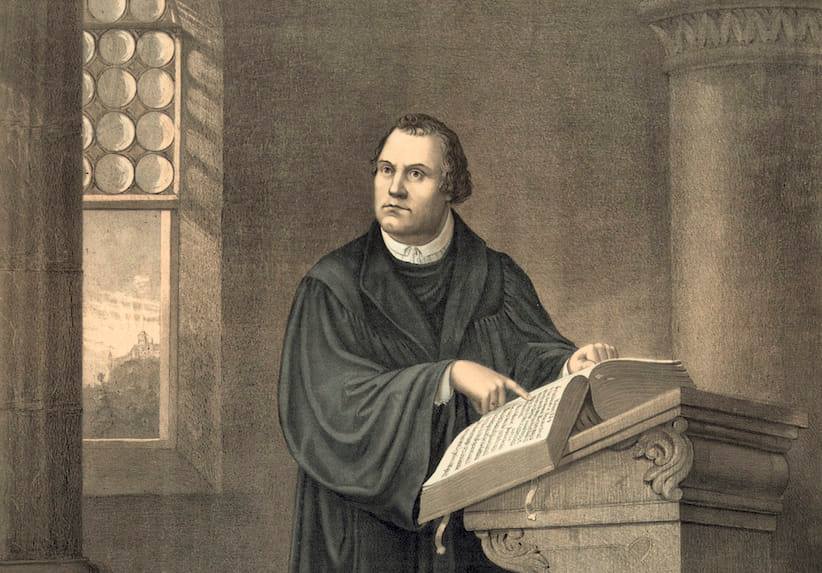Lutherans should celebrate the 500th anniversary of 1520 as a much more significant event than publication of the Ninety-Five Theses in 1517. The Indulgence Controversy and the image of Luther’s hammer has captured everyone’s imagination for a long time. However, in 1520 the Turning Point in the emerging Reformation took place. In this year, Dr. Martin Luther published a numbers of significant texts that demonstrated that theologically he had turned a metaphorical corner and was not looking back.
In a series of short posts, I intend to examine some of these most significant texts over the coming months as a way to recognize this 500th year milestone. I will begin here with Martin Luther’s Treatise on Good Works. Luther had promised Georg Spalatin, Elector Frederick the Wise’s private secretary, to write a sermon to counter the criticism that his theological teachings prohibited good works. He completed the work in May and it appeared in print in June 1520.
In this work Luther explained in detail his theological conception of the relationship between faith and good works for the first time. Late medieval scholastic theologians had sought to explain the connection between faith and good deeds. Two years previously, Luther had rejected the late medieval scholastic theology in his explanations of the Heidelberg Disputation. In thesis 25 Luther concluded, “He is not righteous who does much, but he who, without, work, believes much in Christ.” In the explanation of this thesis, he reversed the scholastic focus on repetitive actions to acquire righteousness. Thereby, he affirmed that faith receives righteousness before the Christian is able to perform good works.*
In the Treatise on Good Works, Luther presents an exposition of the Ten Commandments based upon his theology of justification by faith alone. This fits very well with Luther’s understanding of the First Commandment. First, he writes that true good works are those things that God actually commands in Scripture. Luther focuses his criticism throughout this text on religious activity promoted as good deeds of satisfaction by the papal theologians. Then Luther wrote this significant statement:
“The first, highest, and most precious of all good works is faith in Christ, and as it says in John 6 [:28-29], when the Jews asked him, ‘What must we do, to be doing the good work of God?’ Jesus answered, ‘This is the work of God, that you believe in him whom he has sent.’ Now when we hear that or even preach it, we pass over it: we think nothing of it and think it easy to do, but actually we ought to pause a long time and think it over properly. For in this work all good works exist, and from faith these works receive a borrowed goodness. We must make this absolutely clear, so that men can understand it.”**
Dr. Luther wrote explanations of each of the Ten Commandments throughout the rest of this treatise. Here, he emphasizes the idea that obedience to the commandments only flows from faith in Christ and his redemptive action. He concluded rhetorically in the following manner:
“Look here! This is how you must cultivate Christ in yourself, and see how in him God holds before you his mercy and offers it to you without my prior merits of you own. It is from such a view of his grace that you must draw faith and confidence in the forgiveness of all sins. Faith, therefore, does not originate in works, neither do works create faith, but faith must spring up and from the blood and wounds and death of Christ. If you see in these that God is so kindly disposed toward you that he even gives his own Son for you, then your heart in turn must grow sweet and disposed toward God.”***
*Martin Luther, Heidelberg Disputation, in Luther’s Works, vol. 31, pp. 55-56; Martin Brecht, Martin Luther: His Road to Reformation, trans. James L. Schaaf (Minneapolis 1985), 231-234.
**Martin Luther, Treatise on Good Works, LW 44:23-24 [Emphasis added]
***Ibid., 38. [Emphasis added]
Also posted at: https://wp.cune.edu/matthewphillips/2020/05/29/faith-works-martin-luthers-treatise-on-good-works/


For we are his workmanship, created in Christ Jesus for good works, which God prepared beforehand, that we should walk in them. Ephesians 2:10 ESV
[Christ] died for all, that those who live might no longer live for themselves but for him who for their sake died and was raised. 2 Corinthians 5:15 ESV
Therefore be imitators of God, as beloved children. And walk in love, as Christ loved us and gave himself up for us, a fragrant offering and sacrifice to God. Ephesians 5:1-2 ESV